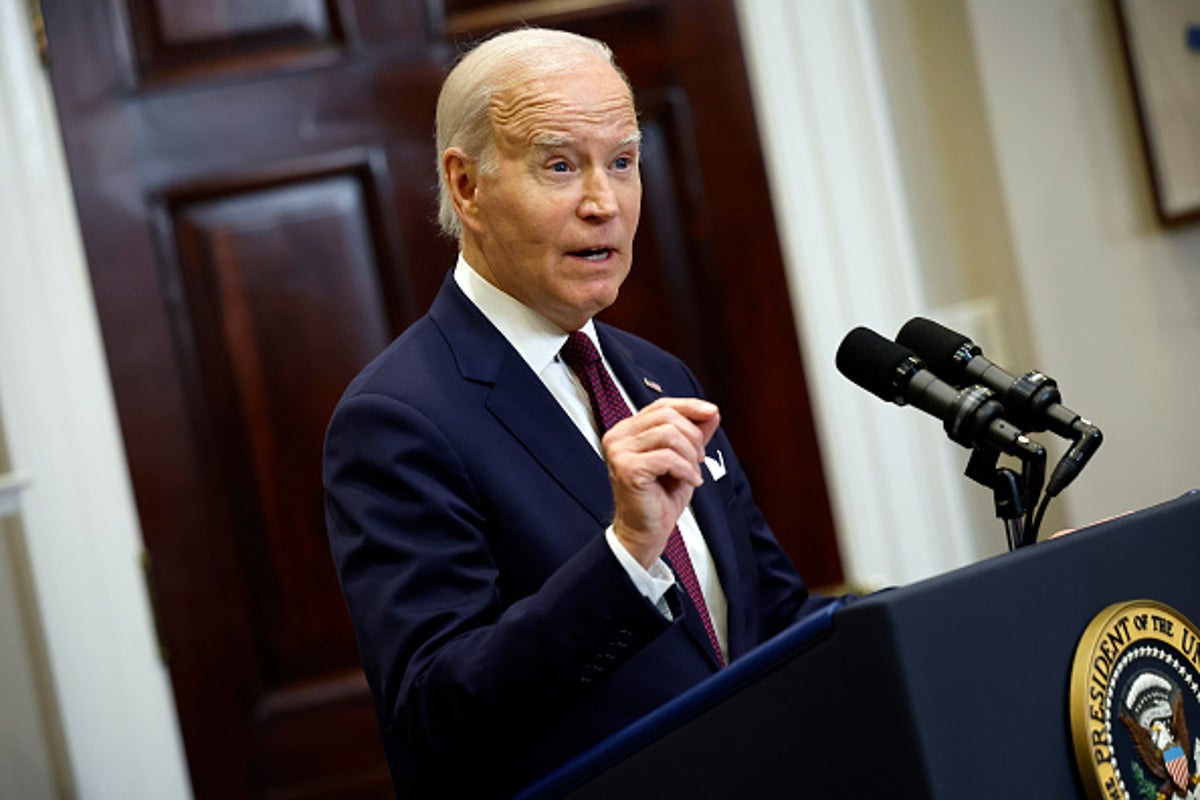
President Joe Biden said he “strongly, strongly disagrees” with a Supreme Court decision to strike down the decades-long use of affirmative action in college admissions in a press conference on Thursday.
“Discrimination still exists in America. Today’s decision does not change that,” Mr Biden said.
The court’s conservative majority overturned admissions plans at Harvard and the University of North Carolina, saying race can no longer be considered as a factor in university admissions.
The landmark ruling overturns generations of affirmative action, which began in the 1960s as a way to increase diversity after the hard-won success of the civil rights movement.
President Biden urged colleges not to let the ruling “be the last word” siding with dissenting Justices Sonia Sotomayor, Elena Kagan and Ketanji Brown Jackson.
Chief Justice John Roberts said that, for too long universities have “concluded, wrongly, that the touchstone of an individual’s identity is not challenges bested, skills built, or lessons learned but the color of their skin. Our constitutional history does not tolerate that choice.”
Justice Clarence Thomas — the nation’s second Black justice, who had long called for an end to affirmative action — wrote that the decision “sees the universities’ admissions policies for what they are: rudderless, race-based preferences designed to ensure a particular racial mix in their entering classes.”
However, Justice Sotomayor wrote in dissent that the decision “rolls back decades of precedent and momentous progress.”
“I believe our colleges are stronger when they’re racially diverse. Our nation is stronger because we are tapping into the full range of talent in this nation. We cannot let this decision be the last word.”
The rulings come from two consolidated cases, Students for Fair Admissions v University of North Carolina and Students for Fair Admissions v Harvard College.
Both were brought by anti-affirmative action organisation, Students for Fair Admissions, headed by conservative legal strategist Edward Blum.
While the court upheld such programmes in a decision nearly two decades ago, the newly-emboldened conservative majority swept away any legal justification for them in Thursday’s opinions.
In a 6-3 and 6-2 decision, it claimed the use of race-conscious admissions was a violation of the Equal Protection Clause of the 14th Amendment.
Now, higher education institutions will no longer be allowed to consider race as a factor in admissions. Instead, students who wish to have their race or culture considered in their application will have to volunteer the information in their personal essay.
Asked about the court’s decision to strike down a long-standing precedent, Mr Biden remarked: “This is not a normal court.”
Leaders from Harvard said in a letter that they would “comply” with the court’s decision but emphasised that “deep and transformative teaching, learning, and research depend upon a community comprising people of many backgrounds, perspectives, and lived experiences”.
Mr Biden said he will direct the Department of Education to find ways to improve diversity without using race as a conscious factor in admissions and recruiting.
The Harvard Black Students Association called the court’s decision “detrimental”, adding that it “poses a significant threat to the future of the Black community on and beyond our campus”.
“It is evident that the college application system cannot maintain holistic evaluation without taking into consideration how race profoundly influences our experiences, perspectives, and identities in multifaceted ways,” it wrote.
Derrick Johnson, president and chief executive of the NAACP, said in a statement: “In a society still scarred by the wounds of racial disparities, the Supreme Court has displayed a wilful ignorance of our reality.”
Discussions around affirmative action have generated debate among Republicans and Democrats for years. Those in support of it believe it is necessary to create fair and equal opportunity for students of color because higher education institutions have failed at creating diverse student bodies.
Those against affirmative action believe it puts other students, such as white or Asian American students, at a disadvantage.
Donald Trump celebrated the ruling, saying it was the result “everyone was waiting for” in a post on Truth Social.
“We’re going back to all merit-based – and that’s the way it should be!” the former president wrote.
Mr Trump appointed three of the six conservative justices on the Court while president: Neil Gorsuch, Brett Kavanaugh and Amy Coney Barrett.
His former vice president, Mike Pence, also expressed support for the court’s decision, tweeting: “I am honored to have played a role in appointing three of the Justices that ensured today’s welcomed decision.”
He added: “There is no place for discrimination based on race in the United States, and I am pleased that the Supreme Court has put an end to this egregious violation of civil and constitutional rights in admissions processes, which only served to perpetuate racism.”
The ruling could have repercussions beyond higher education institutions, extending to elementary, middle and high schools as well as workplaces and more as it opens a door for challenges to racial diversity programs.







